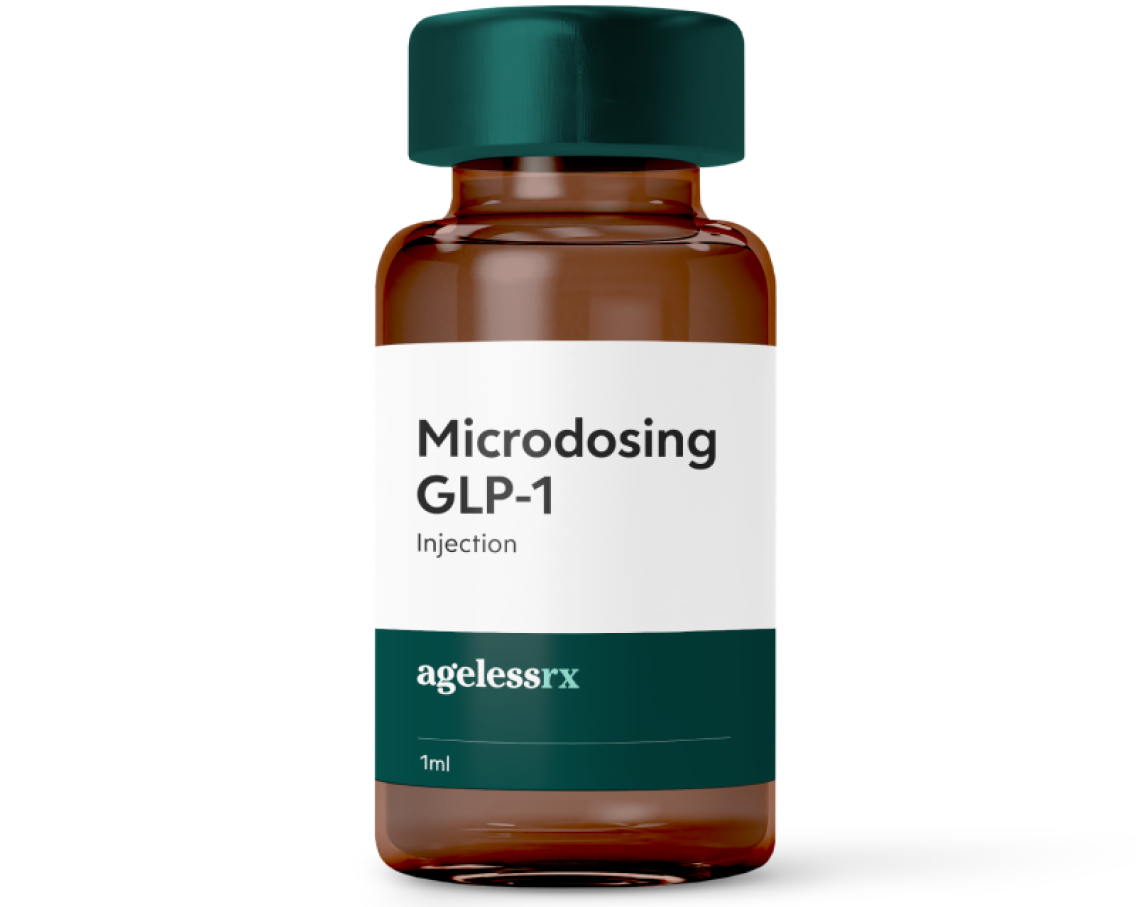
What is Microdosing GLP-1?
- GLP-1 medications may activate key biological pathways that support longevity.¹
- Taking smaller (micro) doses may lower the risk of side effects⁴, creating harmony with your body’s natural processes to support healthspan.
- In one study, microdosing GLP-1s supported moderate weight loss of up to 10 pounds over 40 weeks in participants.⁷
MICRODOSING GLP-1 BENEFITS
Do More, Age Less
- Modulated inflammatory pathways in clinical trials.¹
- Studies found a reduced risk of cognitive decline²
- Supported cardiovascular health in clinical trials³
- Improved mitochondrial function and oxidative stress in clinical trials²
- Low doses reduced side effects in clinical trials⁴
- Supported moderate weight loss of up to 10 pounds over 40 weeks in one study⁷
*See studies cited below.


The science of Microdosing GLP-1
Broad clinical potential: Commonly used to treat type 2 diabetes and weight management, GLP-1 medications act on GLP-1 receptors located in the brain, gut, and immune system, impacting multiple biomarkers.⁶ Recent studies have begun exploring low doses of GLP-1 medications for broader health goals beyond glucose control and weight loss.⁵
Emerging research in healthspan and longevity: In a series of studies, low doses of GLP-1 receptor agonists were shown to modulate inflammatory pathways¹, support mitochondrial function², and lower the risk of cognitive decline² in study participants—giving Microdosing GLP-1 promising potential for extending healthspan.

Ready to get started?
Start your free online visit now.
- 100% online medical assessment
- Free shipping and ongoing support
- Taken 1x weekly by subcutaneous injection
- Compounded at a US-licensed pharmacy
- Pause or cancel anytime
CODE MICRO149: $149 for first month & FREE medical evaluation ($199/month after)
- 100% online medical assessment
- Free shipping and ongoing support
- Taken 1x weekly by subcutaneous injection
- Compounded at a US-licensed pharmacy
- Pause or cancel anytime
CODE MICRODOSE249: $249 for first month & FREE medical evaluation ($299/month after)
You will be automatically billed & sent refills based on your plan
You can pause or cancel at any time before your next shipment
The FDA has not approved or reviewed the Microdosing GLP-1 dosing protocols for safety, efficacy, quality, or for any use, including the AgelessRx compounded product.
*Prescription products require an online evaluation with a licensed medical professional who will determine if a prescription is appropriate. See below for important safety information. Benefits outlined on AgelessRx.com are based on 3rd party studies. Medication is offered as a subscription service which you can cancel at any time. Actual product packaging may appear differently than shown.
FAQs
How do you microdose with GLP-1?
Microdosing GLP-1 uses the smallest measurements on your syringe. Measuring the correct dose is easy, but so is overmeasuring. Pay extra attention to the measurements on your syringe to ensure that you’re receiving the most accurate dose.
Can I transition to a regular dose if needed?
If you’re looking for a higher dose than the maximum prescribed dose, you must switch to a full-dose GLP-1 prescription. If you feel you’re not meeting your health goals on your prescribed dose, contact your prescriber.
See all FAQsImportant safety information and common side effects
Do not use with other GLP-1 receptor agonist medications, or any other products containing GLP-1s.
Side effects
Microdosing GLP-1 is a low-dose Injectable GLP-1 prescription (Tirzepatide or Semaglutide).
Compounded GLP-1s have not been evaluated by the FDA, but side effects are expected to be similar to other GLP-1-based medications reviewed by the FDA, which have the following side effects: nausea, diarrhea, vomiting, constipation, abdominal (stomach) pain, headache, fatigue, dyspepsia (indigestion), dizziness, abdominal distension, eructation (belching), hypoglycemia (low blood sugar), flatulence (gas buildup), gastroenteritis (an intestinal infection), and gastroesophageal reflux disease (a type of digestive disorder).
Common side effects normally go away on their own within a few days or up to 2-3 weeks. Read our blog for more tips on how to manage GLP-1 side effects. If you find that any side effects persist for longer than this or get worse over time, stop taking your medication and contact your prescriber as soon as possible. For a full list of side effects, please review the Mayo Clinic’s Semaglutide and Tirzepatide resources.
Other important safety information
Do not use GLP-1s if you have a personal or family history of medullary thyroid carcinoma (MTC), multiple endocrine neoplasia syndrome 2 (MEN2), or pancreatitis.
The FDA is currently evaluating whether GLP-1 medications may increase the risk of suicidal thoughts or actions. Though the FDA has found no evidence supporting this risk, patients with a history of suicidal thoughts should not take GLP-1 medications.
Do not use GLP-1s if you are pregnant or breastfeeding, or planning to become pregnant or breastfeed.
Though rare, allergic reactions to GLP-1 medications are possible. If you notice any shortness of breath or swelling around your face, tongue, or throat after using GLP-1s, stop using the medication immediately and contact emergency services right away.
As with any prescription medicine, the dose prescribed is for you and you alone. Do not, under any circumstances, allow anyone else to use your prescription.
Tell your healthcare provider about all the medications you take, including prescription and over-the-counter medicines, vitamins, and herbal supplements. Tell your healthcare provider if you are taking any medications to treat diabetes, including sylfonylureas or insulin.
Note: This product alone is not intended to diagnose, treat, cure, or prevent any disease. Please consult a medical professional to determine whether or not Microdosing GLP-1 is appropriate for you.
**AgelessRx’s compounded GLP-1 has not been reviewed or approved by the FDA or analyzed by any available scientific study. However, our medical experts expect that Microdosing GLP-1 may sustain many of the same benefits that low doses of Semaglutide-based injectable medications have shown individually in the studies cited below.
Our idea of bedtime reading? Clinical trials.
We vet everything on PubMed so you don’t have to. Here’s what the science says.
| 1. This review study analyzes human GLP-1 trials, including protocols via injection that may be considered low dose or microdosing. | J Clin Tran Endo, 2024 |
| 2. This review study analyzes human and animal trials of various GLP-1 medications for their role in addressing the hallmarks of aging, such as mitochondrial function and oxidative stress, including low-dose protocols via injection for Parkinson’s patients on exenatide. | Aging and Disease, 2022 |
| 3. The SUSTAIN 6 clinical trial, sponsored by Novo Nordisk, explores cardiovascular outcomes for patients taking Semaglutide injections at doses as low as 0.5mg. | NEJM, 2016 |
| 4. A human trial analyzing patients on Semaglutide injections, showing patients who stopped at lower doses of GLP-1 medications experienced less side effects. | JAMA Network, 2022 |
| 5.This review study explores the potential of GLP-1 RAs beyond their FDA approved uses, including an overview of their essential mechanism of action. | Int J Mol Sci, 2022 |
| 6. A review study of GLP-1 medications’ role in addressing age-related diseases. | Aging Cell, 2023 |
| 7. The results of the Novo Nordisk-sponsored SUSTAIN 7 clinical trial include weight loss outcomes for 301 participants with type 2 diabetes taking 0.5mg of Semaglutide, in addition to Metformin, showing an average of 10 pounds lost over 40 weeks. | Lancet Diabetes Endocrinol, 2018 |

